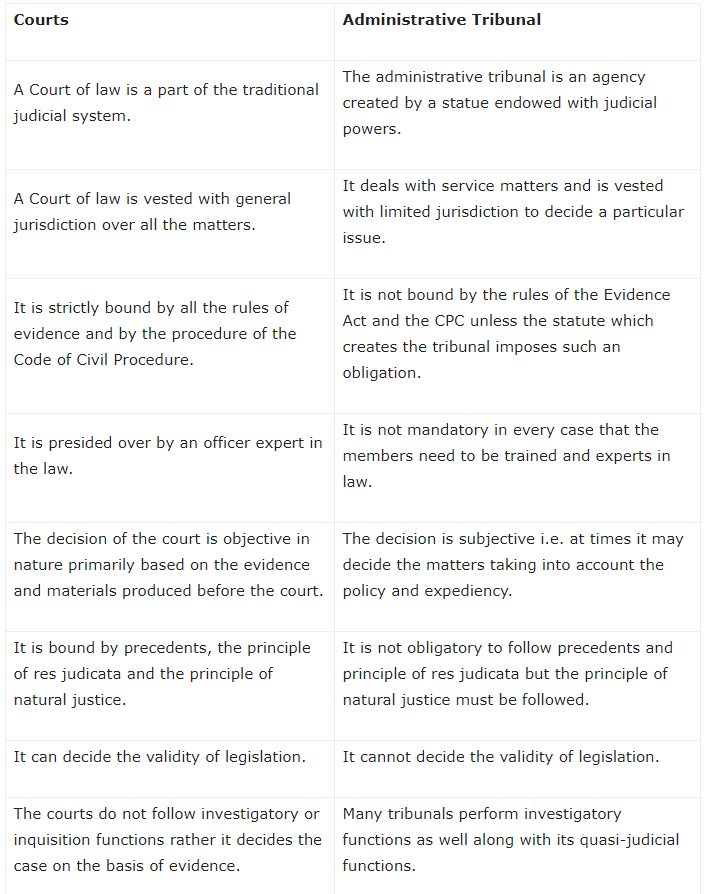Tribunals in India
2021 APR 28
Mains >
Polity > Judiciary > Tribunals
IN NEWS:
- In as many as nine laws, the Centre has replaced the existing appellate authorities and vested those powers in the High Courts through an ordinance, the Tribunal Reforms (Rationalisation and Conditions of Service) Ordinance 2021.
TRIBUNALS:
- The original Constitution did not contain provisions with respect to tribunals. The 42nd Amendment Act of 1976 added a new Part XIV-A to the Constitution entitled as ‘Tribunals’.
- It consists of two Articles:
- Article 323 A:
- It deals with administrative tribunals
- It empowers the Parliament to provide for the establishment of administrative tribunals for the adjudication of disputes relating to recruitment and conditions of service of persons appointed to public services of the Centre, the states, local bodies, public corporations and other public authorities.
- Article 323 B:
- It deals with tribunals for other matters, such as labour reforms, taxation and ceiling on urban property.
- Here, both the Parliament and the state legislatures are authorized to provide for the establishment of tribunals for the adjudication of disputes.
- They follow the principles of Natural Justice and plays an important role in the adjudication of disputes, especially those subjects which demand technical expertise.
- They enjoy some of the powers of a civil court, viz., issuing summons and allowing witnesses to give evidence.
- Its decisions are legally binding on the parties, subject to appeal.
- After the amendments came into effect, the Central Administrative Tribunal was established in 1985 with five different Benches.

SIGNIFICANCE OF TRIBUNALS:
- Reduce load on ordinary courts: The traditional system has been overburdened with ordinary suits. Their procedures are formalistic, expensive and took years to resolve. The tribunal system gives the much-needed relief to such ordinary courts.
- Specialized approach: Tribunals comprise of people who have spent a considerable amount of time on one particular subject or field of knowledge. Hence, they are in a better position to understand technical issues and ensure justice.
- Flexibility: The introduction of administrative tribunals engendered flexibility and versatility in the judicial system of India. Unlike the procedures of the ordinary court which are stringent and inflexible, the administrative tribunals have a quite informal and easy-going procedure.
- Cheaper resolution: Because of its flexibility and informality, the complaints need not be represented by a lawyer. They may be represented by an individual or by themselves. They have few operational formalities. Hence, tribunals ensure inexpensive justice.
- Timely justice: Tribunals follow the principle of natural justice and the procedures are much simpler compared to courts. Also, most tribunals have time limits within which they should dispose cases.
- Quality Justice: Given the ever-increasing complexity of today’s disputes, the administrative tribunals are among the most effective method of providing adequate and quality justice in less time.
CRITICISM OF TRIBUNALS:
- Against the Rule of Law: Rule of law promotes equality before the law and supremacy of ordinary law over the arbitrary functioning of the government. The tribunals somewhere restrict the ambit of the rule of law by providing separate laws and procedures for certain matters.
- Lack of specified procedure: The administrative adjudicatory bodies do not have any rigid set of rules and procedures. Thus, there is a chance of violation of the principle of natural justice and scope for arbitrariness.
- Absence of legal expertise: Members of the administrative tribunals may be experts of different fields but not essentially trained in judicial work. Therefore, they may lack the required legal expertise which is an indispensable part of resolving disputes.
- Pendency and vacancy: The issue of vacancies is neither recent nor exclusive to the courts. Tribunals also suffer from the manpower shortage issues. The 74th Parliamentary Standing Committee Report expressed its concern about vacancies being a source of tribunal instability.
- Absence of uniformity: There is a degree of variation in the appointment process, membership requirements, retirement age, finances, and the different tribunals facilities. These contradictions arise due to tribunals functioning under separate ministries.
- No reduction in burden: After the judgment in L. Chandrakumar case, the Supreme Court made it clear that appeals against tribunals shall lie only before the High Courts. This has only added another level of litigation and has not helped to reduce the burden on courts.
- Losing relevance: Since tribunals now serve as lower than High Courts, many states have considered it better to abolish them because now they would be redundant.
- Lack of Independence with Tribunals: Ministries are often parties in front of the very tribunals whose workers, budgets, and administration they deal with. A revolving door between ministry bureaucracy and tribunal posts further questions the independence of tribunals.
CONCLUSION:
Administration is an important part of government as well as the life of the individual. Because of this, it is important to have a competent authority to redress grievances by people and effectively adjudicate disputes. Hence, strengthening the tribunals is essential and this can be achieved by:
- Ensuring independence: The independence of tribunal on matters of the selection and removal of members, the recruitment of judges/bureaucrats and meeting infrastructure and financial requirements needs to be assured.
- Encourage uniformity: Uniformity among tribunals in matters of age of members, appointment, removal and the operating procedures should be developed.
- Nodal ministry: Administration of tribunals needs a single nodal authority or ministry to improve performance. A consistent recommendation has been to entrust the Ministry of Law and Justice with the duty to administer tribunals.
- National tribunals commission: The Supreme Court in 2020 directed the Centre to constitute a National Tribunals Commission (NTC) which would act as an independent body to supervise appointments and functioning as well as take care of the administrative and infrastructural needs of tribunals across the country.
PRACTICE QUESTION:
Q. The limited success of tribunals in India necessitates the formation of a National Tribunals Commission (NTC). Explain?
